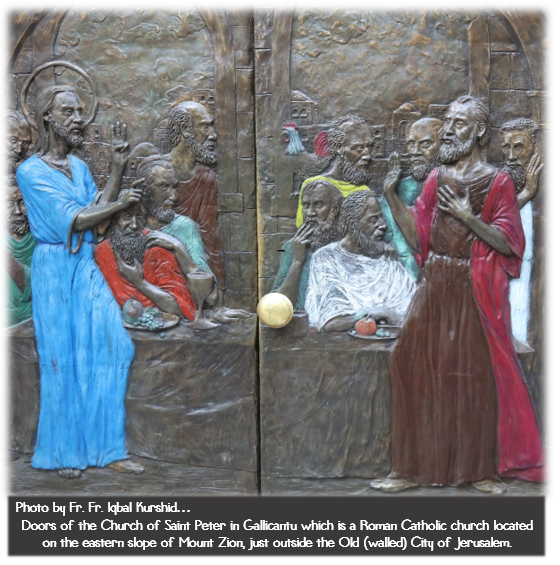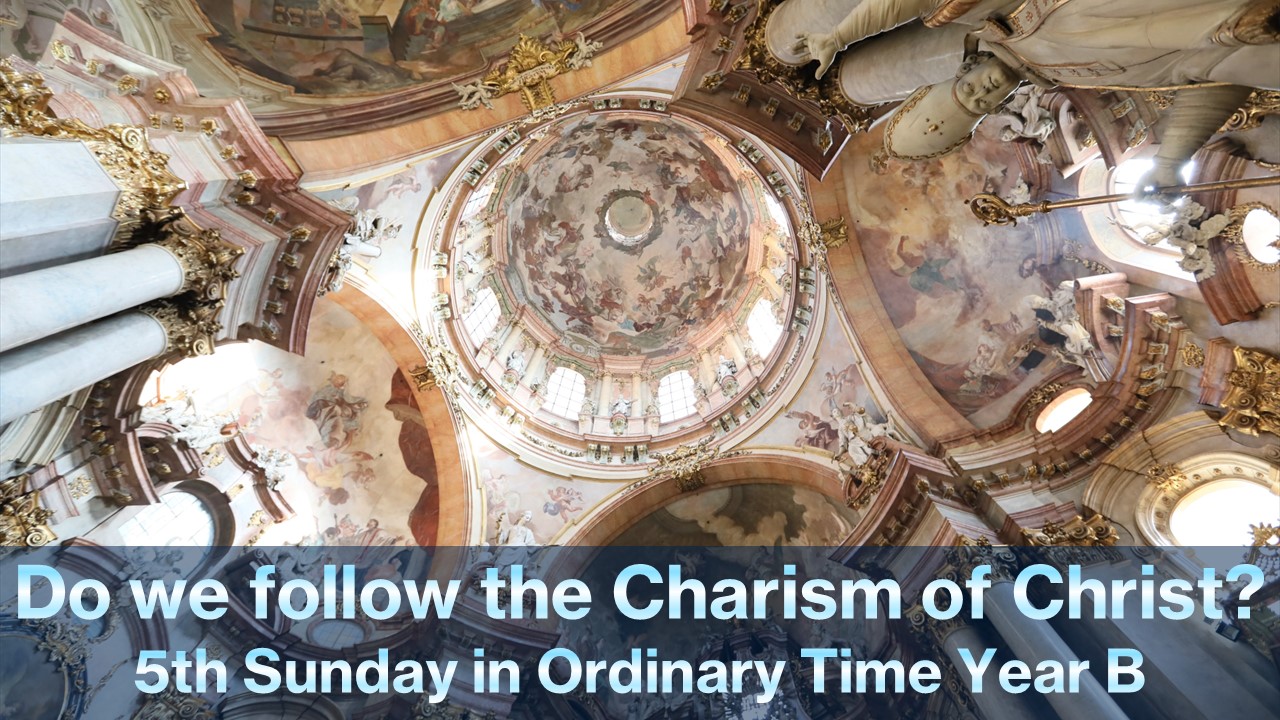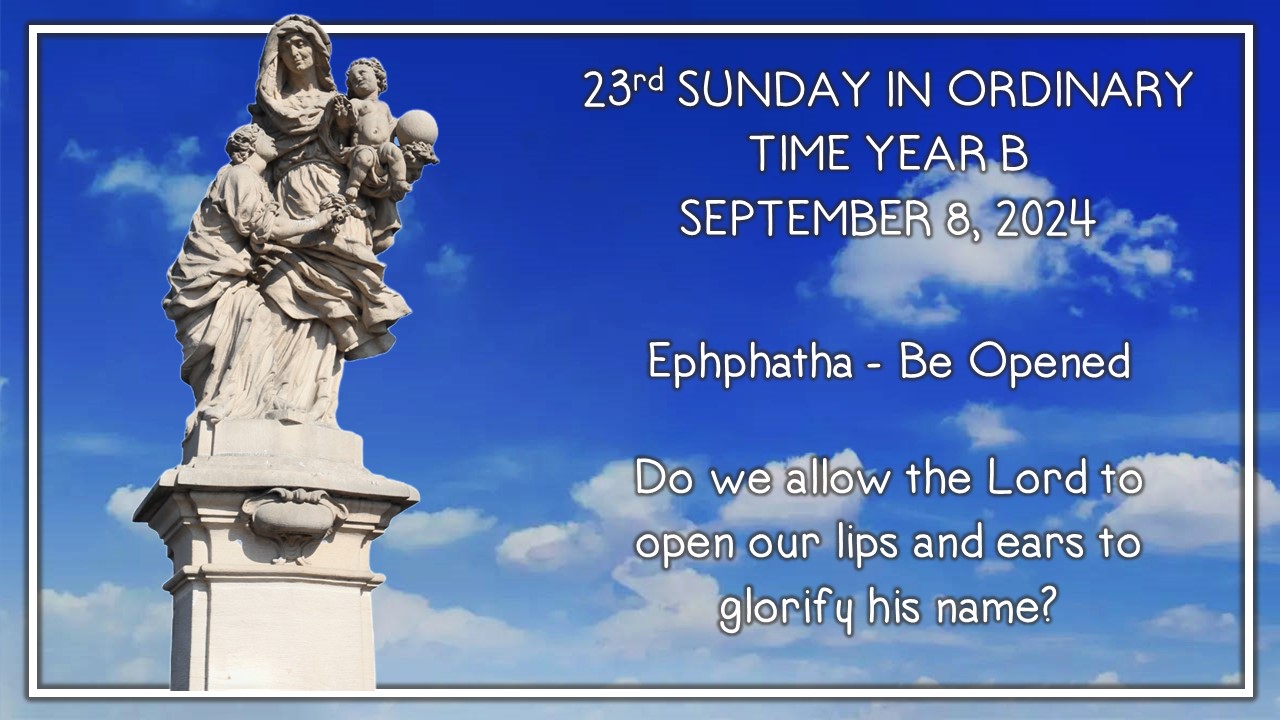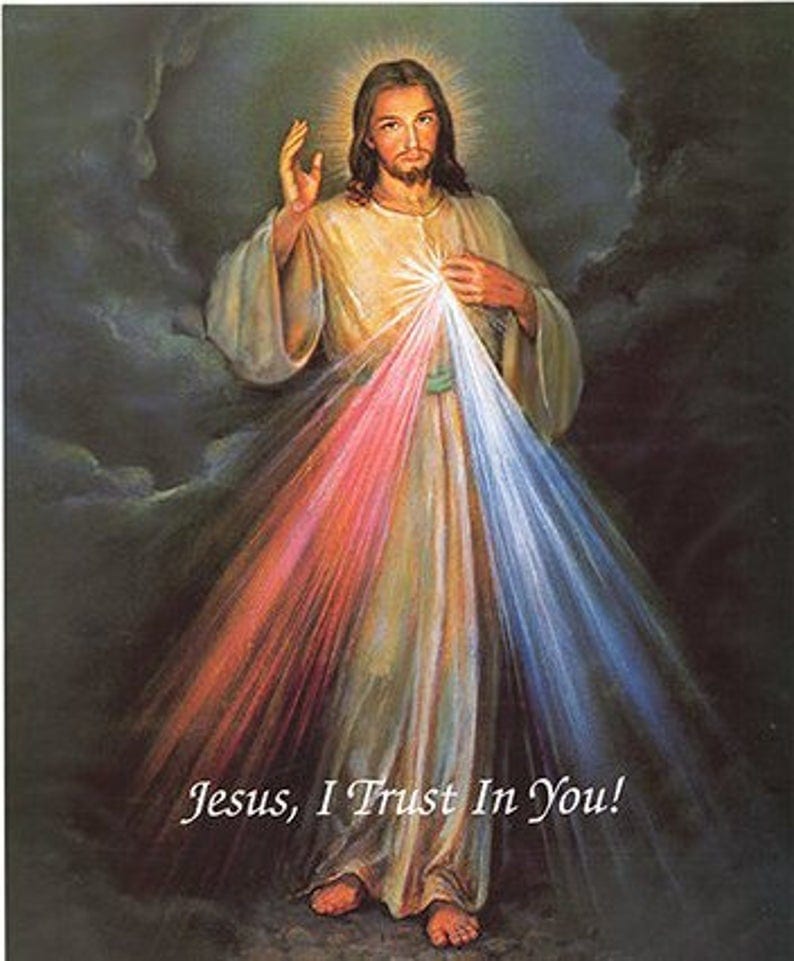
5th Sunday of Easter Year C – May 15, 2022
BY OUR ACTIONS
We continue to reflect on our Easter stories which keep reminding us that our Lord and Savior is with us and walks with us every day. Last Sunday we reflected on the attributes of Good Shepherd who cares about his sheep and never loses any of them. The Lord being our Good Shepherd leads us to green pastures and anoints us with purist of oil because his mercy and love walks before us. St. Maximus explores this mystery in this way “Christ is risen! He has burst open the gates of hell and let the dead go free; he has renewed the earth through the members of his Church now born again in baptism and has made it blossom afresh with men brought back to life. His Holy Spirit has unlocked the doors of heaven, which stand wide open to receive those who rise up from the earth. Because of Christ’s resurrection the thief ascends to paradise, the bodies of the blessed enter the holy city, and the dead are restored to the company of the living. There is an upward movement in the whole of creation, each element raising itself to something higher. We see hell restoring its victims to the upper regions, earth sending its buried dead to heaven, and heaven presenting the new arrivals to the Lord. In one and the same movement, our Savior’s passion raises men from the depths, lifts them up from the earth, and sets them in the heights”
Our Christian does not depend only on words but also on actions and we can see it through the lives of the apostles and early Christians in the Book of Acts of the Apostle. People were converting to Christian faith because they saw the actions or way of their living as Christian. St. Hilary reflects on the true meaning of Christianity rooted in the Holy Trinity in this way “We believe that the Word became flesh and that we receive his flesh in the Lord’s Supper. How then can we fail to believe that he really dwells within us? When he became man, he actually clothed himself in our flesh, uniting it to himself for ever. In the sacrament of his body he actually gives us his own flesh, which he has united to his divinity. This is why we are all one, because the Father is in Christ, and Christ is in us. He is in us through his flesh and we are in him. With him we form a unity which is in God. The manner of our indwelling in him through the sacrament of his body and blood is evident from the Lord’s own words: “This world will see me no longer, but you shall see me. Because I live you shall live also, for I am in my Father, you are in me, and I am in you.” If it had been a question of mere unity of will, why should he have given us this explanation of the steps by which it is achieved? He is in the Father by reason of his divine nature, we are in him by reason of his human birth, and he is in us through the mystery of the sacraments. This, surely, is what he wished us to believe; this is how he wanted us to understand the perfect unity that is achieved through our Mediator, who lives in the Father while we live in him, and who, while living in the Father, lives also in us. This is how we attain to unity with the Father. Christ is in very truth in the Father by his eternal generation; we are in very truth in Christ, and he likewise is in us. Christ himself bore witness to the reality of his unity when he said: “He who eats my flesh and drinks my blood lives in me and I in him.” No one will be in Christ unless Christ himself has been in him; Christ will take to himself only the flesh of those who have received his flesh. He had already explained the mystery of this perfect unity when he said: “As the living Father sent me and I draw life from the Father, so he who eats my flesh will draw life from me.” We draw life from his flesh just as he draws life from the Father. Such comparisons aid our understanding, since we can grasp a point more easily when we have an analogy. And the point is that Christ is the wellspring of our life. Since we who are in the flesh have Christ dwelling in us through his flesh, we shall draw life from him in the same way he draws life from the Father.
St. James the Apostle strongly believed that our words are not enough to speak about our faith in the Lord, but actions are needed as well “What good is it, my brothers, and sisters, if you say you have faith but do not have works? Can faith save you? If a brother or sister is naked and lacks daily food, and one of you says to them, “Go in peace; keep warm and eat your fill,” and yet you do not supply their bodily needs, what is the good of that? So, faith by itself, if it has no works, is dead. But someone will say, “You have faith and I have works.” Show me your faith apart from your works, and I by my works will show you my faith” (2:14-19).
The life of the desert fathers is amazing to reflect upon. They lived in desert meditating and praying. Their actions were more important than the words as we can see in the following story. An Egyptian monk was living in the suburbs of Constantinople: and when the Emperor Theodosius II passed that way, he left his train of courtiers and came unattended to the cell. The monk opened the door to his knock, and at once recognized that he was the Emperor, but he received him as though he was only one of the imperial guards. When he had come in, they prayed together and sat down. The Emperor began to ask him, ‘How are the hermits in Egypt?’ He answered, ‘They are all praying for your salvation.’ The Emperor looked round the cell to see if he had any food and saw nothing except a basket with a little bread, and a flagon of water. The monk said to him, ‘Will you take a little to eat?’ He put the bread in front of him, and mixed oil and salt, and gave him that to eat and drink. The Emperor said to him, ‘Do you know who I am?’ He said, ‘God knows who you are.’ The Emperor said, ‘I am the Emperor Theodosius.’ The monk at once fell down before him and did humble obeisance. The Emperor said, ‘Blessed are you, for you have an untroubled life, without thought of the world. I tell you truly, I was born an emperor and I have never enjoyed bread and water as I have today: I have eaten with real pleasure.’ He began to do honour to the monk, so the hermit went out, and fled back to Egypt.
The conclusion of the Gospel is everything for us this week “you should love one another. By this everyone will know that you are my disciples, if you have love for one another”. Jesus is delivering his farewell discourse while sitting at the dinning table with his disciples. He knows what is going to happen to him and to his disciples afterward. He is encouraging everyone to continue to follow what they have seen and heard from him. God the Father was always with him and have glorified him among all generation and protected him. Jesus’ instructions to his disciples and to us is show our Christian faith by action but only by words. Holy Father Pope gave a beautiful reflection on the Gospel. And I believe we must examine ourselves to see how our faith is doing and how we are witnessing his name to other people. “What an enormous responsibility the Lord gives us today! He tells us that the world will recognize the disciples of Jesus by the way they love one another. Love, in other words, is the Christian’s identity card, the only valid “document” identifying us as Christians. It is the only valid document. If this card expires and is not constantly renewed, we stop being witnesses of the Master. So I ask you: Do you wish to say yes to Jesus’ invitation to be his disciples? Do you wish to be his faithful friends? The true friends of Jesus stand out essentially by the genuine love; not some “pie in the sky” love; no, it is a genuine love that shines forth in their way of life. Love is always shown in real actions. Those who are not real and genuine and who speak of love are like characters in a soap opera, some fake love story. Do you want to experience his love? Do you want this love: yes, or no? Let us learn from him, for his words are a school of life, a school where we learn to love. This is a task which we must engage in every day: to learn how to love”. (Please read 1 Corinthians 13:1-13)
Have you ever used your dinning table as classroom to teach your children and grandchildren the family traditions and faith you cherish? I highly recommend if you are not doing so, start now and you will be surprised to see the awe look on your family members. Look to the Lord, who is never outdone in generosity. We receive so many gifts from him, and every day we should thank him. He offers us his faithful friendship, which he will never take back. The Lord is a friend forever. Even if you disappoint him and walk away from him, Jesus continues to want the best for you and to remain close to you; he believes in you even more than you believe in yourself. This is an example of genuine love that Jesus teaches to us. This is very important! Because the biggest threat to growing up well comes from thinking that no one cares about us – and that is always a sadness – from feeling that we are all alone. The Lord, on the other hand, is always with you and he is happy to be with you. As he did with his first disciples, he looks you in the eye and he calls you to follow him, to “put out into the deep” and to “cast your nets wide” trusting in his words and using your talents in life, in union with him, without fear. Jesus is waiting patiently for you. He awaits your response. He is waiting for you to say “yes”. This is putting tenderness and love into action.
We must remember by baptism we become the member of the Holy Church but by actions we become true disciples of Jesus who for the sake of love died on the Cross so that we may have life and have it in abundance. Jesus wants us to be up on our feet! Think of the beautiful word Jesus said to the paralytic: “Arise!”. God has created us to be on our feet. So, arise! God wants us up on our feet, ever on our feet! And that’s only through our actions to glorify his name. Once Gandhi said, “I love Christianity but hate Christians because their actions are contrary to the Gospel”.
The desert fathers rightly said, ‘We become more humbled when we are tempted, because God, knowing our weakness, protects us. But if we boast of our own strength, he takes away his protection, and we are lost”. Today need to ask the Lord to give strength to witness his name by actions so that people may know that we are his disciples. St. Clement, bishop, and martyr has reminded everyone of us to understand that through our actions as Christians we can enjoy the unity of the Risen Christ because his death is our ransom and his rising from the dead has restored our life to himself. “Beloved, Jesus Christ is our salvation, he is the high priest through whom we present our offerings and the helper who supports us in our weakness. Through him our gaze penetrates the heights of heaven, and we see as in a mirror, the most holy face of God. Through Christ the eyes of our hearts are opened, and our weak and clouded understanding reaches up toward the light. Through him the Lord God willed that we should taste eternal knowledge, for Christ is the radiance of God’s glory, and as much greater than the angels as the name God has given him is superior to theirs. So then, my brothers, let us do battle with all our might under his unerring command. Think of the men serving under our military commanders. How well disciplined they are! How readily and submissively they carry out orders! Not everyone can be a prefect, a tribune, a centurion, or a captain of fifty, but each man in his own rank executes the orders of the emperor and the officers in command. The great cannot exist without those of humble condition, nor can those of humble condition exist without the great. Always it is the harmonious working together of its various parts that insures the well-being of the whole. Take our own body as an example: The head is helpless without the feet; and the feet can do nothing without the heart. Even our least important members are useful and necessary to the whole body, and all work together for its well-being in harmonious subordination. Let us, then, preserve the unity of the body that we form in Christ Jesus, and let everyone give his neighbor the deference to which his particular gifts entitle him. Let the strong care for the weak and the weak respect the strong. Let the wealthy assist the poor and the poor man thank God for giving him someone to supply his needs. The wise man should show his wisdom not by his eloquence but by good works; the humble man should not proclaim his own humility but leave others to do so; nor must the man who preserves his chastity ever boast of it but recognize that the ability to control his desires has been given him by another. Think, my brothers, of how we first came into being, of what we were at the first moment of our existence. Think of the dark tomb out of which our Creator brought us into his world where he had his gifts prepared for us even before we were born. All this we owe to him and for everything we must give him thanks. To him be glory for ever and ever. Amen”.
Let me conclude my reflection with this short story to remind us of our Christian life in action is very important.
One morning, an elderly man was walking along the beach when he noticed a young boy picking something off the sand and throwing it into the sea.
As he got closer, the man realized the child was throwing stranded starfishes that had washed up on the shore back into the breaking waves.
Approaching the boy, the man asked what he was doing.
“The starfish will die if they’re still on the shore when the sun rises,” he replied.
Perplexed, the old man said, “But that’s pointless! There are countless miles of beach and thousands of starfish. It doesn’t matter how many you return to the water; you can’t make a difference.”
Unfazed, the boy bent down, picked up another starfish, and tossed it into the sea.
“It matters to this one,” he said.
Other Sermons In This Series

5th Sunday in Ordinary Time Year B ~ February 4, 2024
February 01, 2024

23rd SUNDAY IN ORDINARY TIME YEAR B ~ SEPTEMBER 8, 2024
September 05, 2024


